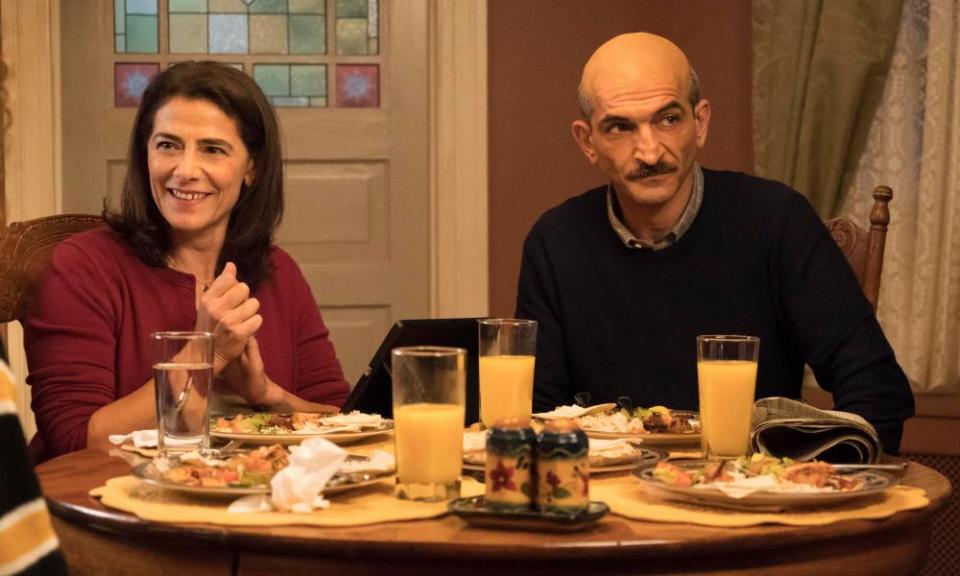Ramy: culture-clash comedy with a deeper message

In the opening episode of Ramy, the titular character – a young Egyptian-American, played by Ramy Youssef – is adrift. He visits a mosque to pray, but is told that he hasn’t washed enough. (“Dirt in your toe is dirt in your heart,” a fellow attender tells him.) He goes to an engagement party where his friends tell him he’s going to die alone, and his chances of meeting a Muslim girl in New Jersey are essentially nil. He tries to prove them wrong, and finds a girl from a similar background, but the resultant date doesn’t exactly go to plan.
A fresh – if at times dark and challenging comedy – Youssef’s series centres on family dynamics, girl problems and the struggle to be something resembling a good person. Despite much buzz in the US – including Emmy and Golden Globes wins – the series has, until now, only been available on the Amazon add-on StarzPlay in the UK, meaning that it wasn’t exactly being talked about on this side of the Atlantic. That may be about to change this week, though, as it begins on Channel 4.
From the toe-washing to working out what a halal stag do might look like (strip club, yes – but alcohol, no?), it’s a series that skips the small talk and goes straight to existential questions. When I interviewed Youssef last year, he told me the series was “about struggle … about that struggle to be your higher self. To be your best self.”
Ramy follows a similar structure to shows such as I May Destroy You, I Hate Suzie, Insecure and Dave, which are built around millennials who represent either alter egos or caricatures of the actors who play them. The result is that these programmes feel intimate and human, and, in their best moments, force the audience to reflect on themselves. One of the most successful things Ramy does is play with viewers’ feelings of proximity and prejudice. Do you come to the show as a young Muslim feeling close to the characters because their lives look and sound familiar? Or do you have preconceived ideas of who they are because they don’t? Wherever you sit at the beginning of the show, you might not be in the same place e after a few episodes.
On the surface, the main characters fit the stereotypical profile of an immigrant family and their children on TV. We have the industrious father, the overbearing mother (Succession’s Hiam Abbass), the frustrated sister and a chauvinistic, bigoted uncle to boot. But throughout each episode, Youssef carefully peels back the two-dimensional characters to reveal complex humans riddled with contradictions. Ramy’s best friend, Steve – played by Steve Way, who has muscular dystrophy – is also a rare disabled character on television who is not patronised or “othered”, but afforded his own narrative.
“Whether it be with writers who are in our room or with people who are in my life, I try to imagine: what are they hiding?” Youssef told me, “I try to have some conversations about the things that are bothering them and the things that they’re fighting for. And then I try to put that in these characters, and make sure that everyone is dealing with something that feels real to what that character should be dealing with.”

In season one, Ramy oversteps a sacred line that is almost universally frowned upon: sleeping with a married woman. He is messy and self-absorbed, continually making mistakes that are about more than just Muslim morality, and seems at times to lose sight of the bigger picture, while going through the motions – something people from all backgrounds can probably relate to.
In season two, he goes in search of guidance in the shape of Mahershala Ali, who plays a sheikh who represents the pious, calm ideal that Ramy wants to embody. The sheikh’s peaceful demeanour is necessary to counterbalance the hypocrisies we see elsewhere, especially when we meet the former porn actor Mia Khalifa in a rich Emirati’s home, or watch Ramy and his friends enjoy a debauched weekend in Atlantic City for the aforementioned stag do. Holiness represents a glimmer of hope – and a sign that Ramy could do better.
For a generation that has grown up in a polarised era of binaries (left/right, right/wrong, good/bad), Ramy draws the gaze closer to home, addressing the grey areas of our lives where we are perhaps most uncomfortable. At a time when everyone is locked indoors with themselves, asking big questions, such shows can help to give an audience perspective and understanding of other people and their motivations, desires and weaknesses. Though some scenes are liable to make you cringe, essentially it’s a show about what makes us human.
Ramy begins on Channel 4 and All 4 at 11.05pm on Friday 5 Feb

 Yahoo Movies
Yahoo Movies 
